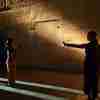Children of imprisoned Iranian activist Narges Mohammadi accept the Nobel Peace Prize on her behalf
The Hindu
The teenage children of imprisoned Iranian activist Narges Mohammadi accepted this year’s Nobel Peace Prize in the Norwegian capital
The teenage children of imprisoned Iranian activist Narges Mohammadi accepted this year’s Nobel Peace Prize in the Norwegian capital on Sunday on behalf of the mother they haven’t seen in years, reading out a speech she penned from a Tehran prison as her medal rested on an empty chair.
Mohammadi, 51, was awarded the 2023 Nobel Peace Prize in October for her decades of activism despite numerous arrests by Iranian authorities and spending years behind bars. She is renowned for campaigning for women's rights and democracy in her country, as well as fighting against the death penalty.
Kiana and Ali Rahmani, Mohammadi’s 17-year-old twins who live in exile in Paris with their father, received the prestigious award at Oslo City Hall, which was richly adored with blue orchids for the occasion. Daughter Kiana read the first part of the Nobel Peace Prize lecture in their mother's name, and her brother continued it.
“I write this message from behind the high, cold walls of a prison," Mohammadi said in the speech. "I am a Middle Eastern woman, and come from a region which, despite its rich civilization, is now trapped amid war, the fire of terrorism, and extremism.”
In the presence of Norway's King Harald and Queen Sonja and other dignitaries, Berit Reiss-Andersen, chairwoman of the Norwegian Nobel Committee, cited Mohammadi's “life-long struggle in support of human rights and strong civil society.”
A large portrait on display showed Mohammadi in pastel colors and smiling.
“She has asked us to use this particular photograph, which expresses how she wants to lead her life, looking happy in colorful garments, exposing her hair and with a steady gaze towards us,” Reiss-Andersen said.













